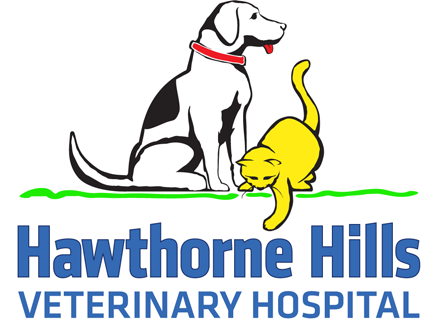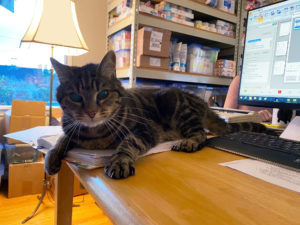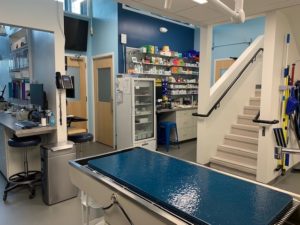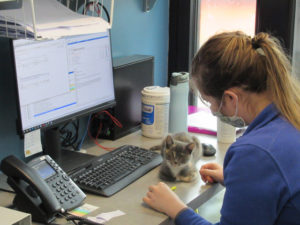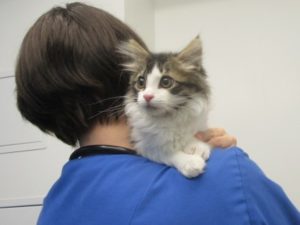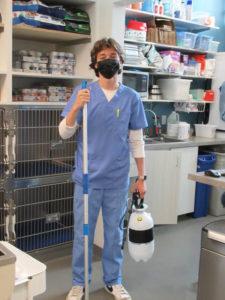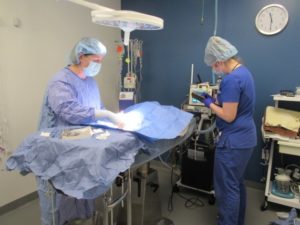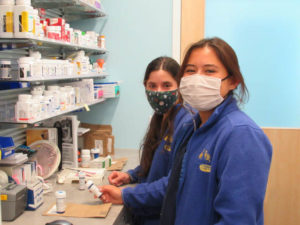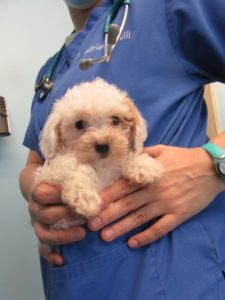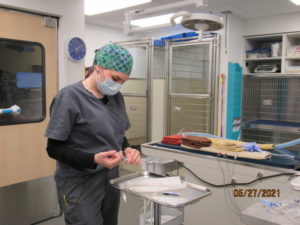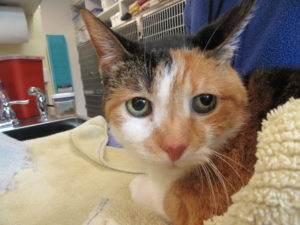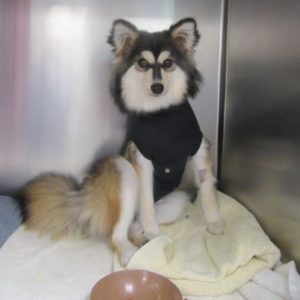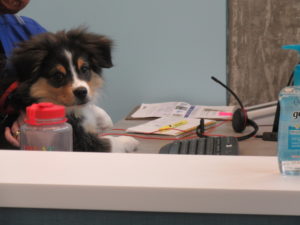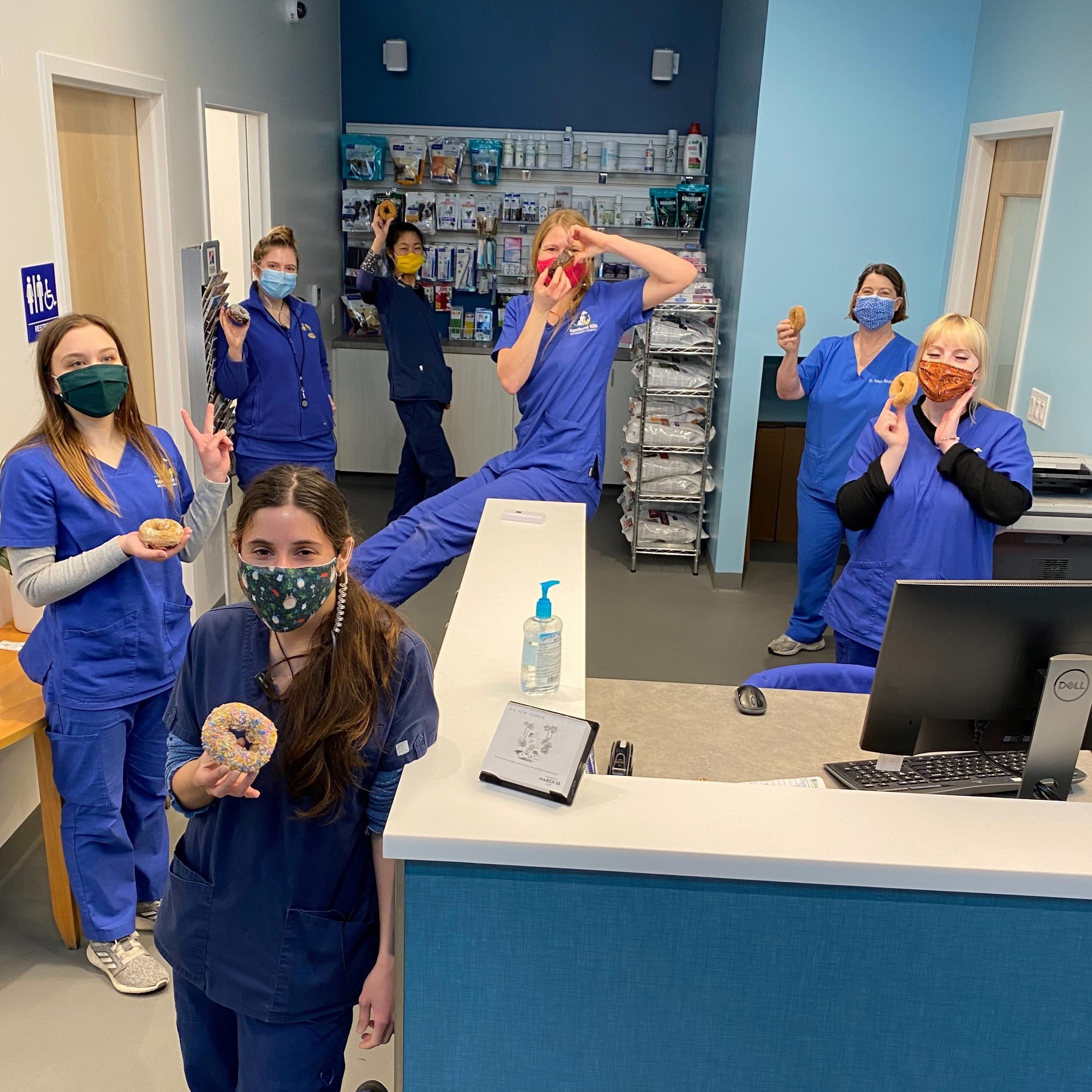
This month I want to shift gears and recognize the employees that make our hospital run and are vital to the care that we provide to you our clients, and to your beloved pets. I want you to know what they do every day to provide you and your pet exceptional care, and the stresses and struggles that also come with the job. Our team is outstanding and the deserve recognition and your support.
The last 18 months have brought a tremendous amount of change to our team and finally we are starting to see the light at the end of the tunnel. The resilience, dedication, flexibility, resourcefulness and just plain, put your head down and work exhibited by our team has been amazing. It hasn’t been easy and I hope that giving you a view into their jobs will help bring some visibility to the work that they do and some appreciation from those we serve.
As many of you know, we moved out of our old hospital location in mid-December 2019 and expected to be in the new space within a week or two. Unfortunately, construction delays intervened. Everything stayed in storage except for our computers and our medication & food inventory. Our team set up a temporary office space in my living room and went to work. Regrettably, several staff members decided that they weren’t up for the challenges of our move and turned in their resignations leaving us with a small but core group of hard workers.
Everyone pitched in and took on a variety of tasks for the next 8 weeks. We learned a new VOIP phone system, spent our time answering phones, fielding emails, and we created a system to scan thousands of medical records as we made the transition from paper records to completely electronic. A monumental task in and of itself!
Our team dedicated themselves to arranging medical visits for pets that needed to be seen through a collaboration with Montgomery Mobile (thank you!) and coordinating with specialists for pets that needed more urgent care. Along the way, we had help from my cats, play time with my dogs, some laughs (okay and a few tears), good food and a number of in-house visits from a few of our long-term clients picking up meds for their pets.
Finally, on February 10th we moved into 6512 – our fresh new space!
Just as we were starting to get settled, unpacking boxes and welcoming you back, COVID-19 arrived.
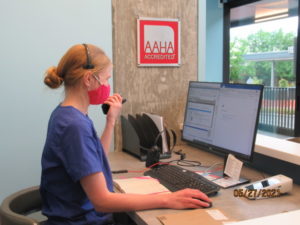 We had to shut down services to just the most essential urgent cases and lost a few more employees who felt they needed to move home with family as travel restrictions and uncertainty mounted.
We had to shut down services to just the most essential urgent cases and lost a few more employees who felt they needed to move home with family as travel restrictions and uncertainty mounted.
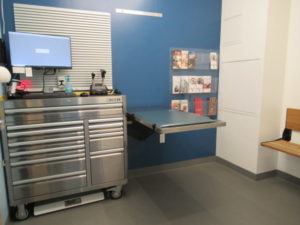 We condensed our hours to be more efficient and revised our protocols to keep everyone as safe as possible.
We condensed our hours to be more efficient and revised our protocols to keep everyone as safe as possible.
We made updates to our medical software, implemented a Telemedicine option, and watched hours of webinars to made the necessary adjustments for our team & your pets.
The contractor was further delayed, so we packed and unpacked supplies as we operated around the construction zone. In all of that, our team continued to provide outstanding care and worked to maintain our high standards.
Starting in May of 2020,
veterinary hospitals were allowed to return to full services, and over the last 12 months we have been challenged.
Our case load has grown tremendously and yet our team has remained small despite our ongoing efforts to add members.
The veterinary industry as a whole has been swamped to put it bluntly.
COVID-19 restrictions have led to a dramatic increase in pet ownership, which is great, but it has also led to extreme shortages in veterinary staffing. Why is there a loss of people in our veterinary medicine, and why is our industry struggling?
The reasons are complex and we don’t have complete answers – some is due to emotional burn-out, an extremely high educational debt load and lower pay, worry about personal health issues & COVID, baby-boomers deciding to retire, and opportunities in other industries that allow work-from home.
What it means however, is every veterinary hospital is overworked and stretched to the max. We are exhausted after 12 months. We are working long hours and our ‘work-life’ balance has suffered. We have been on the front lines the entire 15 months of COVID. Most hospitals are scheduling appointments 2-3 weeks out, sometimes longer for procedures such as surgery and dentistry.
Every day we are trying to ‘work-in’ patients who need to be seen more urgently, and accommodate pet owners who haven’t planned ahead for their pet’s vaccinations, medication refills, well-pet visits, travel requirements etc. etc. etc.
In addition, when your pet needs specialty care, or has an emergency, it is difficult. We aren’t able to talk with the specialists as easily as in the past, because they too are over-worked and understaffed.
In the Seattle area alone, it has been common for the 24×7 emergency & specialty hospitals (of which we have 8 within 30 minutes of our hospital) to have 4-7 hour wait times. Recently some have had to cancel previously scheduled urgent cases or surgeries because there is not enough staff to provide the needed care.
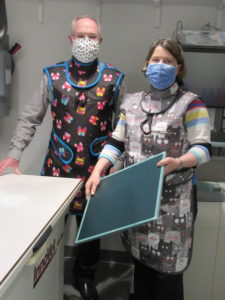
And, the well-being of the veterinary industry is on edge. The emotional toll of dealing with a pet’s illness, seeing pets go without needed care, working with owners who don’t have money or don’t want to spend their money, think we charge too much, tell us something is cheaper online, expect everything on short notice, tell us ‘you don’t care’, or are rude to employees can out-weigh all of the wonderful parts of what we do. Our industry has one of the highest suicide rates and that weighs on all of us. We are doing our best to support each other and yet, we need the support of our clients as well.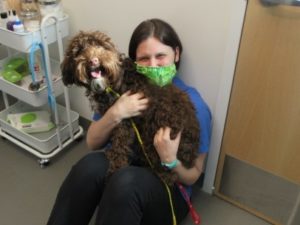
What can pet owners do?
Do your part.
Be an informed, knowledgeable pet owner and follow your veterinarian’s advice.
We have extensive training to help you find the right solutions and are willing to help guide you along the way. We see the consequences of poor or delayed care, and want to do all we can to help your pet stay healthy for a long time. Don’t tell us that your breeder, your next-door neighbor, or your trainer has more experience or knowledge. That is disrespectful and simply not true. Our eight years of specialized education and years of experience exceed a lay person’s advice every time. We have dedicated our lives to helping pets and it hurts us when you tell us we only care about money or the care is too expensive. It can be expensive, but so are a lot of things in life and you have options. Pet insurance for one. Alter your priorities and allocate resources to your pet before you decide to purchase, ‘rescue’ or adopt.
Love your pet in ways that are meaningful.
Provide good care at home, take care of the things you can – grooming, flea and parasite prevention, healthy food, exercise your pet and keep them at an ideal weight. Understand your pet’s emotional needs – teach them manners, and don’t ignore signs of anxiety. Early intervention and practice can help almost every pet learn to cooperate willingly. Look at what zoos have done to teach a gorilla to present an arm for a blood draw or a hippo to accept an ultrasound exam for pregnancy. It is possible to for your pet to be well adjusted but it won’t happen overnight, and your cat won’t love the carrier if it only comes out once a year. Be willing to do your part at home. And if recommended by your veterinarian, don’t discount the value of medication. Decreasing your pet’s stress and fear for needed medical care can be a life-saver, and your pet will thank you.
How can you help us and our team?
Be understanding, be thoughtful and plan ahead. And, tell us how much you appreciate that we are here for you.
If your pet will be needing vaccinations, medication refills, or has a new medical condition or problem, don’t wait. Here are some tips:
- Schedule routine appointments well in advance so that we can find a time that works best for you. And when our team calls or sends you forms for information, please fill them out and send them back. We love not having to nag you for details.
- Make an appointment before the situation turns critical. Many health issues are easier, less time consuming and less expensive to address if we are seeing your pet before they are really sick.
- If you have a new pet, be proactive and collect all of the records from the breeder, the rescue group or the shelter and send them to us. That helps our doctors to be prepared in advance of your visit and they can focus their time on you and your new addition.
- Request medications and prescription foods before the day you are out. A week in advance is so appreciated.
- Support our hospital. When you pay us that allows us to pay our staff, our bills, ourselves and to invest in services and equipment to help your pet. It’s a win-win situation.
- Purchase your pet’s meds or prescription foods from us – we make every effort to
 have what you need in stock and available. Saving pennies by purchasing through Chewy.com, Amazon or some other warehouse operation, supports them, but it takes our staff time and resources, and it doesn’t support our hospital. And, not all online sources of medications are legitimate. [Warnings about counterfeit medications]
have what you need in stock and available. Saving pennies by purchasing through Chewy.com, Amazon or some other warehouse operation, supports them, but it takes our staff time and resources, and it doesn’t support our hospital. And, not all online sources of medications are legitimate. [Warnings about counterfeit medications] - Utilize our online store VetSource for medications that we don’t have in stock, or when you need the convenience of home delivery. It is a reliable source of medications direct from the manufacturer.
- If your pet is on a Hill’s Prescription food – ask to purchase it from Hills To Home. The foods come directly from the manufacturer to your home. Our doctors can authorize all flavors and sizes and you don’t have to ask for new prescriptions if one size bag isn’t available or you want to offer a canned version.
- The same is true if your pet is on a Purina Product. You can set up an account on Purina VetDirect and your food is delivered to home. Our doctors can approve your pet’s prescription food and you control how often it is delivered.
- Purchase your pet’s meds or prescription foods from us – we make every effort to

- Let our team know everything you want the doctor to address when you set up your appointment. That helps us schedule the amount of time needed and ensure that we have the right team members available to help. Adding ‘oh by the way’ issues to an appointment means we may be late for the next scheduled appointment or may not have the time to address your pet’s issue in the best way.
- With curbside services, be sure your phone is on and you answer when the doctor or our team calls. Staying curbside or at a nearby store facilitates timely conversations. Having to make multiple calls, leave messages and then repeat the entire conversation again is frustrating.
- If you need to leave for another commitment during the scheduled visit that is fine; just be up front so that we know what to expect. And yes, there are extra fees if your pet has to stay in the hospital even for a few hours – our team needs to supervise your pet, clean every area your pet was in before we can house another pet, and that takes time and resources.
- Ask questions us if you don’t understand our instructions or need more clarification about the medical plan. We want to ensure that we are meeting your expectations and that you understand what your pet needs.
- Finally, don’t tell us that you ‘don’t need the doctor to do an exam’. We are legally obligated to evaluate every pet we see and we can’t give medical advice or prescribe without evaluating the patient. Saying you don’t want the exam, says ‘I don’t need any professional advice’ or ‘I don’t want to pay you for your time’, in which case, why did you make an appointment?
Thank you for reading this far, and staying with us. For those who are interested, and wonder, what does your day look like?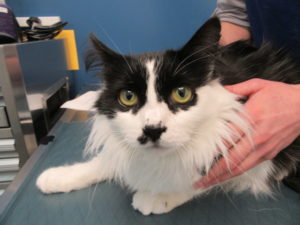
Here’s a look at everything our Customer and Patient Care Team has to accomplish each day.
It is no small feat. We are proud of what we do, but it doesn’t happen without a lot of ‘behind the scenes’ effort, and our team is top notch:
- Fielding dozens of phone calls and responding to dozens of emails every day
- Scheduling appointments and obtaining histories in advance of every visit to ensure we are addressing the issues you are concerned about and providing your pet with the best care
- Admitting and discharging patients from the hospital and helping to educate you about your pet’s home care needs
- Assisting the doctors with ‘out-patient’ visits and ‘in-patient’ medical procedures; ensuring that every pet is getting the attention they need and then recording it all in the medical record
- Making sure your hospitalized pet is safe and taken care of; adjusting blankets, checking vitals, offering food when appropriate, and occasionally a lap or arms for a snuggle
- Scribing during all of our phone calls with clients to ensure our medical records are thorough and complete
- Preparing laboratory samples for pickup by our lab couriers, then sending messages to clients when the results are back, and discussing treatment plans that might be necessary based on the doctor’s instructions
- Communicating with other veterinary facilities, shelters and rescue groups to gather records for new clients and new pets
- Reviewing records sent by specialists and emergency facilities when pets have been seen, to ensure that we are doing our part to maintain the care the pet needs. And, calling you to follow-up when the medical condition or the prognosis is worsening.
- Talking with pet owners via email, text and phone to address medication needs, and to follow-up on patients that were sick or had a medical procedure recently
- Preparing medications and foods to be picked up, sending invoices and applying payments so that we are efficient and ready when you arrive
- Authorizing online prescriptions and helping to trouble-shoot or find alternatives when those products are not available or the delivery is delayed
- Creating estimates for upcoming procedures and answering questions from clients about those procedures
- Participating in staff ‘tune-ups’ to meet and discuss protocols and procedures and prepare for the week ahead
- Maintain our AAHA standards. Our 3-year Accreditation Review is on June 3rd which amidst all we have kept at the forefront. High quality makes a difference to us and to your pet and only 14% of veterinary facilities in the US have achieved this high standard.
- Finding time in the day and after hours to complete training to develop their own new skills
- Continue developing their Fear Free skills and mentoring each other so that your pet’s visit to the veterinarian can be less stressful and more rewarding. Lots of Cheez Whiz, peanut butter, Moist & Meaty treats may have been consumed to achieve this goal.
- Sharing donuts from a special client who has supported us – ‘We Got This Seattle’ – THANK YOU!
- Stopping to relax for a lunch break when the phones are off, and everyone gets an opportunity to recharge and relax
- Cleaning, cleaning, cleaning and throwing in a couple loads of laundry.
So, the next time your stop by,
give us a smile, says thanks, tell our staff how much you appreciate their efforts, write a note we can share, tell others via social media how much we mean to you and your pet. And if we need to improve, let us know in a kind and thoughtful way. We want to meet your expectations and we want to keep doing this for years to come. The dividends for all of us will be immeasurable!
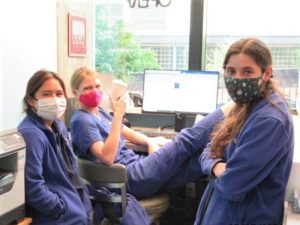
At the end of the day, we do take a moment to relax and build friendships.
AVMA – Responsible Pet Ownership
AKC: Be a Responsible Dog Owner
Purina Pet Care – Ways to be the Best Pet Owner
NY Times; Make a Lifetime Commitment Before Adopting A Pet
ZipRecruiter: Veterinary Salaries by State
